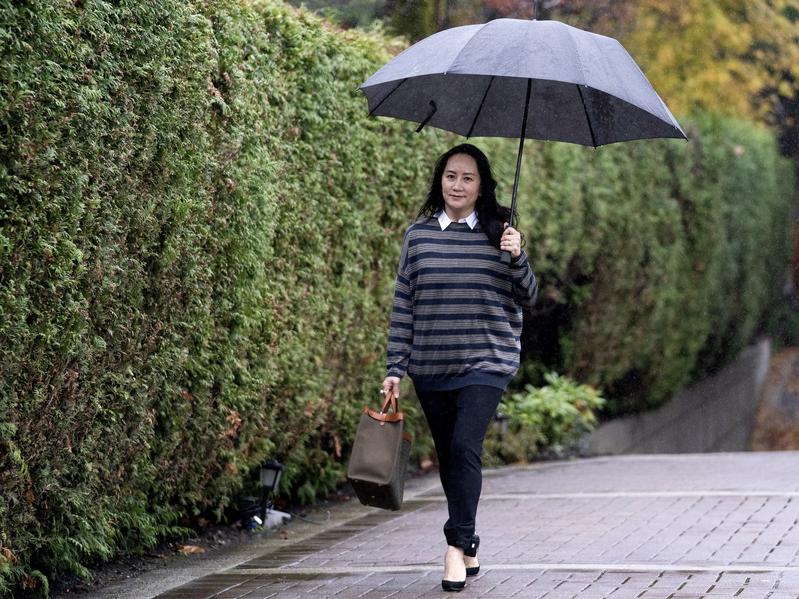 Chief Financial Officer of Huawei Technologies Co Ltd Meng Wanzhou leaves her home in Vancouver, British Columbia, Nov 23, 2020. (JONATHAN HAYWARD / THE CANADIAN PRESS VIA AP)
Chief Financial Officer of Huawei Technologies Co Ltd Meng Wanzhou leaves her home in Vancouver, British Columbia, Nov 23, 2020. (JONATHAN HAYWARD / THE CANADIAN PRESS VIA AP)
While a Royal Canadian Mounted Police (RCMP) officer denied giving information about Huawei Technologies Co Ltd executive Meng Wanzhou's electronic devices to the FBI, Meng's lawyers claimed it was a conspiracy between Canadian and American authorities.
During testimony Monday in the Supreme Court of British Columbia in Vancouver, RCMP Constable Gurvinder Dhaliwal, who took custody of Meng's electronics on the day she was arrested, disclosed an apparent contradiction between his evidence and the accounts of two of his supervisors.
One of them has denied passing along any information to the FBI, and the other supervisor, Sergeant Janice Vander Graaf took notes indicating that Staff Sergeant Ben Chang sent serial numbers to the US agency.
Dhaliwal told the court that he did not receive any request from Canadian or US authorities to obtain Meng's passcodes for her electronic devices. But according to notes recorded, Graaf indicated that Dhaliwal told her that Chang, who has refused to testify, complied with the request.
Constable Gurvinder Dhaliwal of the Royal Canadian Mounted Police (RCMP) disclosed during testimony Monday an apparent contradiction between his evidence and the accounts of two of his supervisors
Meng, 48, the chief financial officer for the Chinese telecom company, was arrested at the request of US authorities on Dec 1, 2018, at Vancouver International Airport. She is facing extradition on fraud charges alleging that she put HSBC at risk of violating US sanctions against Iran, which Meng and Huawei have denied.
ALSO READ: Conspiracy claimed in Canada arrest
The FBI had made clear its interest in obtaining the information but would normally need to go through a mutual legal assistance treaty between agencies to get it, according to court documents and testimony.
"Gurv advised Ben Chang had email and provided serial #'s," reads the notes from Vander Graaf, who is scheduled to testify later this week.
Meanwhile, under cross-examination by defense lawyer Scott Fenton, Dhaliwal admitted he did not read the warrant and the details contained within, including the provision for immediate arrest of the Huawei executive — nearly three hours after Canada Border Services Agency (CBSA) officials began questioning her as part of a border exam.
Meng's defense argued that the three-hour CBSA check was used improperly to help RCMP and US authorities in obtaining devices and passcodes without telling Meng her charter rights. The defense also targeted the fact that CBSA Officer Scott Kirkland wrote down the passcodes on a piece of paper during a secondary inspection — a document that was then passed on to the RCMP.
And for the first time, the court also heard that security codes for at least one of Meng's homes in Vancouver were also recorded on a piece of paper. Dhaliwal said the paper was passed to him by an RCMP officer with no idea where that officer got it, according to the Canadian Press.
Meng Wanzhou's defense argued that the three-hour Canada Border Services Agency check was used improperly to help RCMP and US authorities in obtaining devices and passcodes without telling Meng her charter rights
The conflicting evidence has sparked questions from Canadian media audiences.
"Either Dhaliwal & his cohort passed on the material to the FBI & is lying; or they failed to protect it from them & are criminally incompetent. Either way, this case should be thrown out hard enough to bounce to Washington," commenter "Mark Mealing" posted on the CBC News website.
"The operation was well coordinated and executed to the dot. Meant to leave as little paper trail as possible," commented "Mark Mark". "Since the US has the arrest warrant for this woman since August, she had traveled to 8 countries that have extradition with the US. Her itinerary shows she is going (to) 3 more countries after stopping at Canada. Why did the FBI choose Canada? Because it proved to be most (cooperative), because of our 'special' relationship, we are not going to question the superficial charges."
READ MORE: Meng's lawyers challenge extradition points
The high-profile case has harmed Canada-China relations. Citing deteriorating relations and the rise of Sinophobia in Canada, Canadian MPs have launched a campaign to release Meng.
At a "Zoom to Free Meng Wanzhou" online panel discussion organized by a group of experts from research institutes and universities on Tuesday evening, the Green Party's Paul Manly was scheduled to participate in the forum along with the New Democratic Party's Niki Ashton and former Cabinet minister Jane Philpott.
"I don't consider this a rally to free Meng Wanzhou; I consider this a debate about how we get ourselves out of that situation, and that lies squarely with the Trump administration," Manly told the media. "Donald Trump abused the trust of Canadian authorities and abused international diplomatic norms. The timing of Meng's arrest in Vancouver was a cynical manipulation of the Trump administration."
One of the Zoom discussion's organizers, Ken Stone, treasurer of the Hamilton Coalition to Stop the War, rejected the notion that the "Free Meng Wanzhou" event was promoting so-called "Chinese propaganda".
"We regard the arrest of Meng Wanzhou as an attempt by the USA to drag Canada, against its national interest, into a new cold war with China," Stone told the Toronto Star.
He advocated for a "closer economic relationship" with China, saying that "we should diversify" away from the US, which is Canada's largest trading partner.
Agencies contributed to this story.


